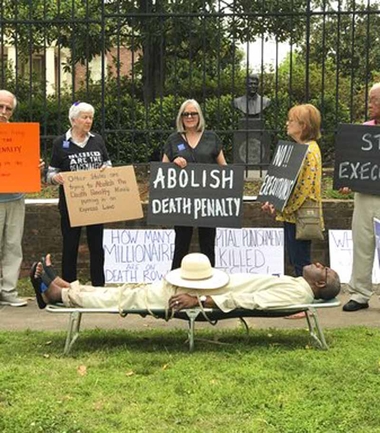Judge's anti-death penalty protest riles conservatives

Little Rock, Ark. (AP) — After barring Arkansas from executing eight inmates in rapid succession because of a dispute over how it obtained one of its execution drugs, Judge Wendell Griffen went to an anti-death penalty rally, where he made a stir by lying down on a cot and binding himself as though he were a condemned man on a gurney.
Griffen's participation in Friday's protest outside the governor's mansion sparked outrage among death penalty supporters, including Republican lawmakers who described it as judicial misconduct and potential grounds for Griffen's removal from the bench.
Griffen, a Pulaski County circuit judge, said he's morally opposed to the death penalty and that his personal beliefs alone shouldn't disqualify him from taking up certain cases. For years, he has been pushing the boundaries of how much a judge can speak out on controversial issues.
"We have never, in my knowledge, been so afraid to admit that people can have personal beliefs yet can follow the law, even when to follow the law means they must place their personal feelings aside," Griffen told The Associated Press on Saturday.
On Friday, Griffen granted a restraining order preventing Arkansas from using its supply of vecuronium bromide, one of three drugs it uses in executions, because the supplier said the state misleadingly obtained the drug. The ruling came a day before a federal judge halted the executions on different grounds. The supplier, however, on Saturday sought to drop its lawsuit and have Griffen's order lifted because it believed the federal ruling removed the imminent risk its drug would be used in executions.
The back-to-back decisions upend what had initially been a plan to execute eight men in 11 days in four double executions, starting Monday night, because the state's supply of one of the other execution drugs expires at the end of the month.
Attorney General Leslie Rutledge on Saturday also asked the state's highest court to vacate Griffen's ruling, citing the judge's participation in anti-death penalty events before and after he issued it. She asked for a new judge to be assigned the case.
"This court should put a stop to the games being played by a judge who is obviously unable to preside over this case impartially," Rutledge's wrote in her request.
Griffen declined to comment on the demonstration or his ruling, saying he'd address any questions about it at a hearing he scheduled for Tuesday.
Lawmakers have suggested the move may be grounds for the Arkansas House to begin impeachment proceedings, saying the demonstration and a blog post Griffen wrote on the death penalty this week may amount to "gross misconduct" under the state constitution.
"He is outside the bounds of normal behavior for most judges probably anywhere in America," Republican state Sen. Jason Rapert said.
It's also unclear whether the move would prompt action from the state's Judicial Discipline and Disability Commission. Griffen, who served 12 years on the state appeals court, previously battled with the panel over remarks he made criticizing President George W. Bush and the war in Iraq. The panel ultimately dropped its case against him.
Griffen testified in 2015 before the state Legislature against a religious objections measure that was criticized as anti-gay, and he regularly blogs about current events in posts that weave in Biblical passages. They include a post days before his ruling which criticized the execution push in Arkansas.
"While the world meditates about divine love, forgiveness, justice, and hope, Arkansas officials plan to commit a series of homicides," he wrote.
Griffen, 64, is a Baptist minister who was first elected as Pulaski County judge in 2010. He ran twice unsuccessfully for state Supreme Court — including a bid for chief justice in 2004. In his other state Supreme Court race in 2006, Griffen challenged his rival to a debate over the free-speech rights of judges.
Griffen said he wouldn't consider a person's participation in an anti-execution event enough, on its own, to warrant disqualifying a juror from a death penalty case. The question, he said, is whether the juror could set his or her personal views aside and follow the law.
"We do not require people to come into court with blank slates, either in their minds or their heart," he said.
By Andrew DeMillo, Associated Press. Copyright 2017 Associated Press. All rights reserved.
The Gayly – April 16, 2017 @ 7:30 a.m.





